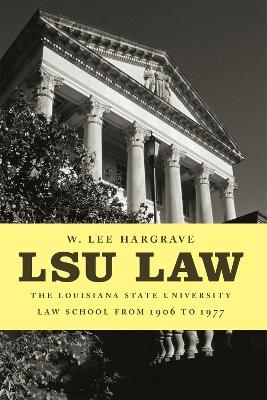
LSU Law
The Louisiana State University Law School from 1906 to 1977
Seiten
2023
Louisiana State University Press (Verlag)
978-0-8071-8039-6 (ISBN)
Louisiana State University Press (Verlag)
978-0-8071-8039-6 (ISBN)
From its founding in 1906, the Louisiana State University Law School has offered its students a truly distinctive legal education. In LSU Law, W. Lee Hargrave chronicles the first seventy years of this institution - from its opening to the death of its longtime dean, Paul M. Hebert, and its transformation into an autonomous Law Center.
From its founding in 1906, the Louisiana State University Law School has offered its students a truly distinctive legal education. Integrated programs in Louisiana's unique civil law, in Anglo-American common law and federal law, and in international and comparative law create a global law curriculum recognized for both its academic excellence and its outstanding teaching, research, and public service faculty. In LSU Law, alumnus and professor W. Lee Hargrave chronicles the first seventy years of this institution—from its opening classes to the death of its longtime dean, Paul M. Hebert, and its transformation into an autonomous Law Center. He reveals the faces and forces that have helped to create the special mystique surrounding the school and the significance attached to a law degree from LSU.
After an initial discussion of the legal profession in Louisiana before the establishment of formal academic instruction, Hargrave maps the school's growth and development. He charts the organizational difficulties of the early years, reputation building in the twenties, politically influenced extravagance in the thirties, wartime challenges in the forties, return to normalcy in the fifties, steady growth in the sixties, and overcrowding in the seventies. Throughout, he explores all aspects of the school—its administrators and faculty, student body, shifting admission requirements, curriculum, grading system debates, influence on Louisiana's legal community and state government, and much more. He also describes how students lived and learned during each era and discusses the effects of outside people and events—including Huey P. Long, World War II, and the civil rights movement—on the school.
Hargrave tells the history of the LSU Law School in the context of changes that occurred in legal education throughout the United States, making his work of interest to legal historians and the national law school community. Alumni will also appreciate this detailed study of what has become a Louisiana institution.
From its founding in 1906, the Louisiana State University Law School has offered its students a truly distinctive legal education. Integrated programs in Louisiana's unique civil law, in Anglo-American common law and federal law, and in international and comparative law create a global law curriculum recognized for both its academic excellence and its outstanding teaching, research, and public service faculty. In LSU Law, alumnus and professor W. Lee Hargrave chronicles the first seventy years of this institution—from its opening classes to the death of its longtime dean, Paul M. Hebert, and its transformation into an autonomous Law Center. He reveals the faces and forces that have helped to create the special mystique surrounding the school and the significance attached to a law degree from LSU.
After an initial discussion of the legal profession in Louisiana before the establishment of formal academic instruction, Hargrave maps the school's growth and development. He charts the organizational difficulties of the early years, reputation building in the twenties, politically influenced extravagance in the thirties, wartime challenges in the forties, return to normalcy in the fifties, steady growth in the sixties, and overcrowding in the seventies. Throughout, he explores all aspects of the school—its administrators and faculty, student body, shifting admission requirements, curriculum, grading system debates, influence on Louisiana's legal community and state government, and much more. He also describes how students lived and learned during each era and discusses the effects of outside people and events—including Huey P. Long, World War II, and the civil rights movement—on the school.
Hargrave tells the history of the LSU Law School in the context of changes that occurred in legal education throughout the United States, making his work of interest to legal historians and the national law school community. Alumni will also appreciate this detailed study of what has become a Louisiana institution.
W. Lee Hargrave (1943-2002) was a professor emeritus at the LSU Law School, where he taught from 1967 to 2000. He was a principal architect of the Louisiana State Constitution and author or coauthor of The Louisiana State Constitution: A Reference Guide, Louisiana Matrimonial Regimes, and several casebooks.
| Erscheinungsdatum | 08.07.2023 |
|---|---|
| Zusatzinfo | 15 Halftones |
| Verlagsort | Baton Rouge |
| Sprache | englisch |
| Maße | 152 x 229 mm |
| Gewicht | 272 g |
| Themenwelt | Geisteswissenschaften ► Geschichte ► Regional- / Ländergeschichte |
| Geschichte ► Teilgebiete der Geschichte ► Militärgeschichte | |
| Recht / Steuern ► Rechtsgeschichte | |
| Sozialwissenschaften ► Pädagogik | |
| ISBN-10 | 0-8071-8039-4 / 0807180394 |
| ISBN-13 | 978-0-8071-8039-6 / 9780807180396 |
| Zustand | Neuware |
| Informationen gemäß Produktsicherheitsverordnung (GPSR) | |
| Haben Sie eine Frage zum Produkt? |
Mehr entdecken
aus dem Bereich
aus dem Bereich
neueste Manipulationstechniken als Waffengattung der NATO
Buch | Softcover (2023)
Westend (Verlag)
24,00 €
Deutschlands Schwäche in der Zeitenwende
Buch | Softcover (2023)
C.H.Beck (Verlag)
18,00 €


